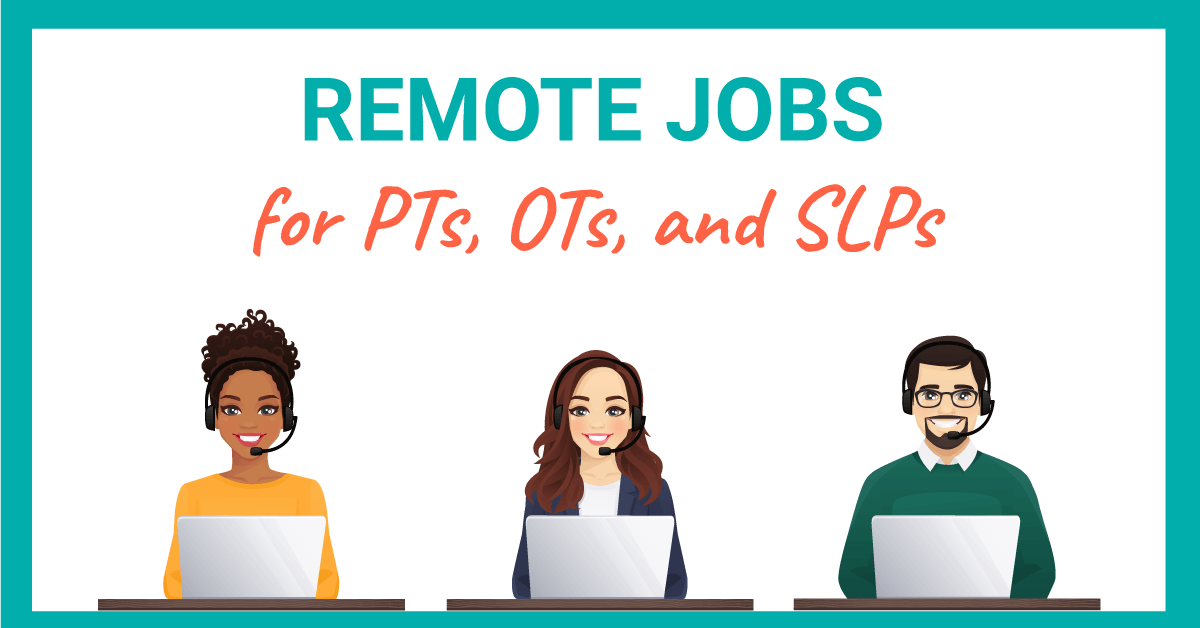Let’s face it: physical therapy, occupational therapy, and speech-language pathology are extremely demanding jobs. You show up for your patients, day in and day out. The highs of being in a clinic and directly working with patients may be higher than any other job—but the daily grind can wear on you.
It’s no surprise that so many clinicians find themselves wanting a change from going into the clinic or hospital each day.
The good news is that it’s very possible to work from home with a PT, OT, or SLP background!
And there’s even better news: if you’re feeling pretty done with patient care altogether, your options extend far, far beyond telehealth. If you’re willing to think outside the box, you can use your therapy background to work from home in all sorts of different non-clinical jobs.
Let’s explore some roles that frequently let you work from home. Keep in mind that there are many more opportunities beyond the ones below! However, for now, we’ll cover:
- What each career path is (and what type of remote PT/OT/SLP work is involved)
- Pros and cons of each type of work
- How to get started in that specific role
A quick heads up!
Don’t miss our remote work FAQs at the end of the article, where we answer:
- Does remote work = FLEXIBLE hours? (You might be surprised!)
- Will you get LONELY working from home?
- Does your LOCATION matter (hybrid positions, rural areas, living abroad)?
- HOW do you stand out in a highly competitive field of applicants?
Table of contents
- 10 remote jobs for physical, occupational, and speech therapy professionals:
- Remote jobs for PT, OT, and SLP professionals DO exist!
- Work from home jobs for PT, OT, and SLP assistants exist, too!
- FAQs: remote physical, occupational, and speech therapy jobs
- OK, I’m feeling super overwhelmed, but also excited! What now?

If the list below overwhelms you, we can help! Non-Clinical 101 walks you through the entire process of going non-clinical, saving you tons of heartache and time!
This post may contain affiliate links or codes. This won’t increase your cost, but it helps keep TNCPT alive, and free of annoying ads! Thank you for your support. 🙂
10 remote jobs for physical, occupational, and speech therapy professionals:
1. Telehealth

Let’s start with the obvious one. We know, we know. We just said there’s more out there, but hear us out.
Telehealth PT, OT, and SLP jobs are now well-established, alternative means to deliver care—and they offer so much potential to expand access! While some areas of the country are saturated with therapy providers, there are still huge swaths of the nation that are underserved. We’ve heard this called “therapy deserts.” There simply aren’t enough local clinicians to fully serve patients who need us in some places.
Telehealth enables providers to reach those underserved populations, and it also lets them focus on what they do best: educate. Plus, telehealth providers can do this without the physical burden of direct patient care.
More and more companies are emerging with solutions to help practitioners practice remotely in two different ways: independently and by joining established teletherapy companies.
It’s important to note: if you’re thinking of going virtual, you need to stay up-to-date on the legality and reimbursement of telehealth. There was quite a bit of temporary legislation going on during COVID, helping patients to safely see providers via telehealth. However, the future of reimbursement, legality, HIPAA requirements, and all that fun stuff is still somewhat up in the air. As always, check your state practice act and stay current with payor policies.
At the end of the day, telehealth might not replace in-person care (and that’s a good thing), but you can certainly expect it to forge ahead in some way or another. We’re already seeing other iterations of tech-supported care emerging, such as remote therapeutic monitoring (RTM). RTM uses an approved digital health platform or device to interact with and manage patient care remotely. If incorporating more technology into patient care is your passion, this might be a good adjunct to your current practice! Like telehealth, RTM is a relatively new service, so we will be watching its impact on the therapy world.
Bottom line: telehealth and virtual care are evolving. Some companies utilize therapists in more supervisory roles, while “health coaches” and “trainers” and “exercise specialists” do much of the one-on-one work with patients. Other companies take a more tech-driven model, using artificial intelligence and/or virtual reality to connect with patients. More and more states are joining the PT license compact, which provides reciprocal licensure for therapists licensed in member states. Finally, it’s important to note that telehealth PT providers must treat patients who are physically located in states in which the practitioner is licensed.
Pros
- Opportunity: Anytime you enter a field in its early stages, there are tons of opportunities to grow professionally. Even if you enjoy the idea of telepractice, you might find that you want to pursue a leadership role, such as a clinical operations team lead or director of operations job, within the telehealth world. Many companies are new, so there are plenty of ways to stand out and rise quickly through the ranks, even if you start out with a clinical title like hybrid physical therapist or digital health PT at Hinge.
- Easy transition: As long as you’re comfortable providing care without relying too much on manual therapy, you’ll make an easy transition into the world of teletherapy. Plus, this might be something you can start doing at your current job! If you can add a few telehealth visits onto your caseload, it’s a great way to dip your toes in and gain experience as a hybrid physical therapist.
- High hourly pay: Teletherapy jobs are known for offering high hourly pay, which is great if you’re looking for a lucrative PRN-style role. We will say, since telehealth became more popular during the pandemic, hourly pay hasn’t been looking quite as high, but it is easier to find full-time work than it used to be 🙂
Cons
- Reimbursement concerns: As we all know, insurance is frustrating and confusing—but many of us are still stuck in the model of relying on it. Until cash-based therapy becomes the norm, or Medicare leads the way with reimbursements, this will continue to limit how quickly this niche grows. As we mentioned, some of the temporary rules and laws (state-specific AND insurance-specific, what fun!) out there that enable reimbursement for care have an uncertain future. Feeling passionate about access to telehealth? The best thing you can do is advocate! Check out these resources from the APTA, AOTA, and ASHA.
- Inconsistent hours and spotty benefits: While it’s easier than before to find full-time work in telehealth, many positions are still PRN or part-time. Yes, that means a higher hourly rate in most cases, but if you need full-time work, you might be out of luck.
- Assistants don’t have as many options: We’re happy to say that assistants have more options than they did when we first wrote this article, but you’ll still have more opportunities in telehealth if you’re a PT, OT, or SLP vs. an assistant.
Best places to find telehealth PT, OT, and SLP jobs:
- The Non-Clinical PT free email list: Most Sundays, we blast out non-clinical job opportunities, many of which are remote!
- Companies’ own websites: You’ll find remote jobs on sites like Indeed, but the competition is fierce. You’re better off setting reminders on companies’ sites, so you’re alerted early and get first dibs. We’ve linked an article below, where you can see listings of telehealth PT companies hiring therapists.
- FlexJobs: You will need to join this site and pay a low monthly or weekly membership fee, but they vet all the jobs they list so you know you’re accessing only legit, high-quality telehealth positions.
» Learn more about telehealth in our article: Telehealth Physical Therapy: Everything You Need to Know and in this article our founder wrote for OT Potential, Telehealth Occupational Therapy.
» Read about tips for providing effective school-based telehealth.

2. Blogging/digital entrepreneurship

If you enjoy reading sites like The Non-Clinical PT, Pink Oatmeal, OT Potential, The Traveling Traveler, or OT Flourish, you’re a blog enthusiast! And, if you happen to enjoy writing and have a bit of an entrepreneurial edge to you, you might really enjoy the freedom and flexibility of working as a therapy blogger or digital entrepreneur.
Personally, we think the best remote job out there is blogging/online entrepreneurship.
We are partial to this career path because, as you probably imagine, TNCPT makes most of its income from blogging, where we sell online courses that have helped thousands of rehab professionals launch non-clinical careers.
Check out this spotlight on Clarice Grote, an OT who runs an advocacy and OT policy site! She took our Therapy Blogging 101 course and replaced her clinical income with earnings from her site!
Online entrepreneurship is extremely enjoyable, flexible, and fulfilling. But, being a blogger or digital entrepreneur also comes with its fair share of challenges. We want to be fair and cover both for you.
Pros:
- You’re the boss: Being your own boss is so liberating. Nobody is going to give you the stink eye if you spend all morning in an adult onesie with your cat in your lap. 🙂
- No sketchy management: This kind of goes with being the boss, but one of the best parts about blogging is that you can make the rules. If you get a bad vibe from someone, you don’t work with them. It’s that simple. If you resent having to work for CEOs who seem lazy or sketchy or just plain mean, you’ll love how that’s just not a thing in the digital entrepreneurship space. You have 100% say over the people with whom you interact on a regular basis…and that’s priceless!
- Assistants can blog: Sometimes, assistants can get frustrated by what seems like a lack of opportunity in the non-clinical world. Yes, there are PLENTY of options out there, but it can feel like you’re starting from behind the 8-ball, as they say. Assistants make great digital entrepreneurs, and they’re often in a better position financially because their education was cheaper than “full therapists.” This allows them to invest more money into growing a website and experimenting with new sources for revenue.
- Income is passive after a certain point: Whether you’re earning income via affiliate partnerships, course or product sales, or advertising, much of your work is front-loaded when you’re a blogger. After your initial setup, you often can sit back and relax a bit. Sure, you still need to advertise and create campaigns to drive income, but it’s a great feeling to see “course purchase” or “product sale” pop up on your phone when you haven’t touched your computer all day.
Cons:
- You’re the boss: Yep, what can be seen as a pro is sometimes a con. If you’re the collaborative type, it can be a rude awakening to realize all decisions sit squarely on your shoulders. That means that all successes are yours, but so are all failures. It also means you need to be a self-starter or your website might not gain much traction.
- Monetizing takes time: Digital entrepreneurship is fun and lucrative when you do it right—but it’s less thrilling when you realize you’re eating ramen for the twelfth day in a row! One of the biggest challenges of running any online business is figuring out how to generate income. Some blogs make money from affiliate marketing, while others make money by selling ad space. And then you have the websites that offer memberships, products, CEUs, and business coaching/mentorship. The sky is really the limit, but you do have to put in the work to build a solid foundation before the money starts coming in.
3. Utilization review

Utilization review (UR) careers are hotter than ever—and they’re nearly all remote these days! Utilization reviewers, often called clinical review specialists, therapist reviewers, and clinical reviewers, are responsible for reviewing therapy usage and ensuring providers are delivering evidence-based, efficient care. With all the insurance fraud out there, many therapists find these roles to fulfill their desire to reduce waste in healthcare.
Pros:
- Using your degree: Sometimes, there’s a guilt or fear associated with doing work that doesn’t directly require a therapy license. When you’re in UR, you definitely use that rehab degree to its fullest—without physically working with patients.
- Improving standards of care: Most of us have worked in sketchy facilities that really do take advantage of insurance companies. If you’re sick of seeing fraud and waste go unchecked in healthcare, being a clinical reviewer could be a great fit for you.
- Predictable hours: UR jobs tend to run on very predictable schedules. Unlike some work-from-home PT/OT/SLP jobs, you typically know you’ll begin and end work at a set time each day, which is really appealing!
Cons:
- Negative connotation: Some therapists look at you askew when you mention you’re going into utilization review. That’s because it can be associated with denying care. In reality, a lot is invested into companies’ teams of therapists, who stay up-to-date on best practices and help determine what constitutes appropriate care.
- Can be repetitive: If you’re the type who craves variety, you might find the repetitive nature of UR and clinical documentation review a bit boring.
- Competitive: We were seeing a shift away from assistants being used in UR roles, but now we’re seeing more of a shift back toward it again. Overall, it’s hard to say whether things are getting better or worse for assistants, but there are definitely jobs out there for you…just not quite as many as therapists will find. That said, even PTs, OTs, and SLPs can expect lots of competition for jobs. You’ll need a really solid application package to stand out when you apply for jobs. And, with increased competition comes lower pay, so UR professionals aren’t always getting hired at the same comparatively cushy salaries that they were even five or ten years ago.
Best places to find utilization review PT, OT, and SLP jobs:
- Non-Clinical Networking & Jobs for Rehab Professionals: This is our FREE Facebook group. Join and find UR job listings in our monthly job thread.
- The Non-Clinical PT free email list: Most Sundays, we blast out non-clinical job opportunities, many of which are remote UR roles.
- Companies’ own websites: You’ll find roles on sites like Indeed, but the competition is fierce. You’re better off setting reminders on companies’ sites so you’re alerted early and get first dibs on roles like Pre-Service Coordinator (also known as Clinical Review Coordinator) and more!
» Learn MUCH more about utilization review careers in our article: Utilization Review Careers: How to Get Started

4. Writing

We didn’t include this in the same section as blogging/digital entrepreneurship because writing and blogging are really two different career paths. Blogging and online entrepreneurship involve far more than writing, such as keyword research, marketing, and figuring out revenue streams—not to mention staying ahead of competitors (and having competitors at all can be an uncomfortable experience for collaborative types).
Writing, on the other hand, is purely about writing. It’s all you do. You can get away with blogging if you enjoy, but don’t love, writing. That’s because your time is spent on other tasks beyond creating articles.
However, in order to build a successful career as a health or medical writer, you need to LOVE writing—and be really good at it. But it’s VERY possible to be successful in this lucrative and stable remote role!
Pros:
- Flexible: Most writing jobs, even full-time, salaried ones, allow plenty of flexibility in your schedule. You’ll likely be able to work from home at least part of the time as a writer. Most writing jobs in the post-COVID era are 100% remote. You can also have a PT/OT/SLP side hustle as a writer pretty easily!
- Full-time jobs abound: Once you prove yourself as a talented writer, you should be able to land a full-time role as a health or medical writer without much difficulty.
- Easy to leave healthcare altogether, once established: The skills you learn as a writer are very transferable to other career paths. If you love writing but feel bored covering the same topics that bore you in the clinic, you can leave and write about just about anything you want!
Cons:
- Can take awhile to start earning good money: You might spend a lot of time at the beginning writing for free (or low pay), just to get your name out there as a talented and reliable writer. That said, you will earn good money soon enough. If you put the time in, you’ll match your therapy salary pretty quickly, then you’ll likely start to out-earn a clinical salary once you land the clients you want (if you’re a freelancer) or once you join an established company (if you are an employed writer).
- Can be tough to make the plunge: Unless you’re quite fortunate, you’ll likely have to gradually transition out of patient care and ease into writing. This means starting out freelancing before you land a full-time gig (assuming that’s what you want: full-time work).
- Can get boring: One of the reasons many writers move toward blogging/digital entrepreneurship, marketing, editing, or content management is that writing can get boring when it’s all you do, day-in, day-out.
Best places to find PT, OT, and SLP writing jobs:
- Non-Clinical Networking & Jobs for Rehab Professionals: Join our FREE Facebook group, where you can find remote writing jobs in our monthly jobs thread!
- The Non-Clinical PT free email list: Most Sundays, we blast out non-clinical job opportunities, some of which are remote writing roles.
- Companies’ websites: You’ll find roles on sites like Indeed, but the competition is fierce. You’re better off setting reminders on companies’ sites so you’re alerted early and get first dibs.
- Staffing agencies: Consider working with Aquent or Creative Circle, both of which boast a good selection of health content writer jobs. In the past, you often had to be local to these agencies’ locations, but post-COVID, many of these roles are remote!
- Glassdoor, Indeed, and LinkedIn: These sites often list the best benefited, full-time jobs. However, as noted above, staffing agencies and companies’ websites often have great opportunities you wouldn’t find otherwise.
» Learn more about writing careers in our article: How to Become a Health Writer (for PT/OT/SLP Professionals)

5. Client/customer success

Client/customer success roles involve helping new clients get onboarded with a company’s products or services (and helping existing clients stay happy and become repeat customers). Simply put, the job is all about helping clients have the best customer experience possible—because happy and successful customers tend to be loyal customers as well.
CS professionals can be called “account managers” as well, though this term often refers to sales roles. And, while sales roles are often great for therapy professionals and can be remote, they usually involve some travel and in-person work. On the other hand, many client success roles are 100% remote!
You’ll find these jobs at EMR companies, tech firms, digital health companies, and even hospital chains!
Pros:
- Helping: Client success roles really leverage our helping nature, as well as our communication skills. That same rush you get from helping someone walk can be felt when you help a new customer get the most from their investment!
- Career growth: When you work in customer success, you’re opening the door to tons of related roles, as well as management opportunities. Plus, client success is a growing field, so there’s more job stability than some other remote jobs.
- Easy to make the transition: While there are plenty of fantastic customer/client success courses and bootcamps out there, you don’t have to take any formal coursework to make this leap. The extra coursework and investment in yourself are always wise, but we know plenty of folks who made the move into CS simply by making the right tweaks to their resume, cover letter, and LinkedIn profile—and, of course, interviewing well!
Cons:
- Presentations: For some reason, many of us in the rehab space are really scared of presenting in front of others! You’ll want to hone your public speaking skills if you want to enjoy this type of work. Yes, even when you present remotely, it can be a bit nerve racking!
- Doesn’t leverage your degree: Again, you don’t really need a rehab background for these client/customer success jobs. Though formal healthcare licensure can definitely be super helpful, you might feel kind of sad that you have all that debt and back pain, only to wind up working alongside someone fresh out of undergrad.
- Not always the highest pay: Backing up, though…this really depends. Some success manager roles pay more than therapy jobs right out of the gate—but others can be much lower. You’ll need to really understand the nature of the work, the company’s financial health, and other factors when you apply for these jobs. The nice thing is that good CS professionals nearly always get great raises and upward mobility. Wish we could say the same about clinical care!
Best places to find client success jobs:
- Non-Clinical 101 alumni networks: When you join the Non-Clinical 101 alumni network (lifetime membership comes with enrollment in NC101), you will always get first dibs on these roles, which are frequently shared in our alumni groups. We’ll share more about Non-Clinical 101 at the end of this article!
- The Non-Clinical PT free email list: Most Sundays, we blast out non-clinical job opportunities, many of which are remote client success jobs perfect for physical, occupational, and speech therapists and assistants.
- Non-Clinical Networking & Jobs for Rehab Professionals: Join our FREE Facebook group, where you can find remote physical therapy, OT, and SLP jobs in our monthly jobs thread!
» Learn more about customer/client success careers in our article: Customer Success Careers for Clinicians

6. Rehab technology

Rehab technology is an emerging field you should definitely consider…especially if you’d like to work from home. Before COVID hit, you usually had to live in a major tech hub to land these roles. (Think: San Francisco Bay Area, Los Angeles, Seattle, NYC, etc.)
These days, rehab technology companies tend to be much more flexible about not just their locations, but also about hiring PT, OT, and SLP professionals into their ranks!
There are tons of different rehab tech jobs out there: product management, product specialist/clinical sales, clinical manager/trainer, user experience researcher (also known as UX researcher), UX consultant, patient trainer, supervisor of patient training, clinical appeals specialist, and so many more. You can even take a more tech-related role within academia, like patient simulation developer! You can learn about tech and education roles in Non-Clinical 101, which we discuss at the end of this article!
The main consideration is figuring out your skills, interests, passions, and lifestyle needs—then picking a rehab tech role that works for you. Some do require travel and/or onsite visits, so do some homework to figure out what’s right for you!
Pros:
- Growth opportunity: Rehabilitation technology jobs have tons of growth potential, not just within a given company, but also within the field and even beyond healthcare. Once you get your feet wet in the industry, you can make bank!
- Using your education/degree: In many of these roles, your clinical experience and education are coveted, even if they’re not technically required for you to land the job.
- Excitement: There’s nothing quite like working in technology. It’s exciting, dynamic, fast-paced, and stimulating.
Cons:
- Intense: Given that many of these roles still carry that big-city mentality of hustling, the work culture can be intense. Don’t expect to log off at 5 pm sharp for many of these roles.
- Competitive: Many of these roles can be competitive and require you to jockey for recognition and promotion. Workplace politics are real in tech!
- Can be unstable: Since so many rehab technology jobs are at startup companies, you might find yourself in roles that don’t have great benefit packages or ask you to work for low pay in exchange for “potential to grow.” At least initially. (Kind of like those clinics that offer “mentorship” in exchange for decent pay.) Plus, the tech industry has a reputation of flying high during strong economies…and quickly laying people off during recessions.
Keep in mind, the rehab technology field is changing all the time. We’ve only just seen the beginning of technology being incorporated into the rehab world!
Best places to find rehab technology jobs:
- Non-Clinical 101 alumni networks: When you join the Non-Clinical 101 alumni network (lifetime membership comes with enrollment in NC101), you will always get first dibs on these roles, which are frequently shared in our alumni groups. We’ll share more about Non-Clinical 101 at the end of this article!
- The Non-Clinical PT free email list: Most Sundays, we blast out non-clinical job opportunities, many of which are remote rehab technology roles for physical, occupational, and speech therapists.
- Companies’ websites: Yep, research the rehab tech you love and get on those websites to look for jobs!
- Wellfound and Built In: These are great sites to find startup jobs, including rehab technology ones.
7. Public health

Public health roles don’t always spring to mind when you think of remote jobs (or rehab jobs in general, for that matter)…but there are plenty of work-from-home opportunities in this space. Here’s a great spotlight on a PT who has worked remotely as a public health PT since well before the pandemic hit!
Rehab professionals are doing some incredible work in public health. Improving health equity and access to care, developing health-promotion programs, improving quality of life for people with disabilities—the list goes on!
Pros:
- Helping: Public health roles really fill that need that many of us have to help, help, help…to truly make a difference in the world.
- Career growth: This type of career does have a good amount of upward mobility, especially if you’re willing to invest in yourself and get some extra education.
- Loan repayment opportunities: If you need to work in a non-profit for loan payment reasons, you’re more likely to find a company that falls into that category in this space than you would in, say, rehab technology or utilization review.
Cons:
- Pay: Unless you get your masters in public health (MPH), you might not make the pay you made as a treating therapist/assistant.
- Typically requires additional education to move up: Yes, you can certainly land work-from-home public health and population health roles, even without extra education, but having that MPH is really going to give you a much-needed leg up to advance in the profession. That said, a certified health education specialist (CHES) certification can take you far in the profession, even without the MPH!
Best places to find public health jobs:
- Government websites and Idealist: You’ll find tons of opportunities locally, though some might not be remote.
- Non-Clinical Networking & Jobs for Rehab Professionals: Join our FREE Facebook group, where you can find remote physical therapy, OT, and SLP jobs in our monthly jobs thread!
- The Non-Clinical PT free email list: Most Sundays, we blast out non-clinical job opportunities, some of which are remote public/population/community health roles for physical, occupational, and speech therapists.
8. Consulting

Perhaps the ultimate work-from-home lifestyle comes from consulting. Not only do you nearly always have the ability to work remotely, the pay tends to be high (if you play your cards right). Plus, you can really leverage all the experience you’ve built up. Consultants work for startups, large companies, and everything in between. You can even work for the more traditional companies, like the “Big 4” accounting firms. And, over time you can move into bigger roles like senior consultant.
If you’re interested in consulting, one thing to consider is whether you want to do it independently or work for a consulting firm. This will dictate factors like whether you need to set your own rates, how to get clients, etc. It can be super rewarding to go it alone, but there are perks to working with a firm as well. Curious to learn more? Non-Clinical 101 has much more information on consulting, including how to set your rates and market yourself to clients.
Pros:
- Lucrative: If you play your cards right, you can make bank as a consultant.
- Career growth: Once you’ve worked as a consultant, your career opportunities dramatically expand.
- Flexibility: Many consulting roles (unless they’re explicitly full-time) enable you to work the hours you want.
Cons:
- Instability: Many consultants are seen as stop-gaps between full-time employees. If you want that gold pin after 25 years and those sweet, sweet benefits…you might not want to do consulting unless you can find a full-time opportunity.
- Must find clients, negotiate rates, etc: As we noted, you can absolutely work a stable job as a consultant. However, many consulting jobs require that you work odd hours, set rates, and advertise yourself to find those clients in the first place.
- Education: Quite a few consulting roles require (or strongly prefer) an MBA.
Best places to find consulting jobs:
- Networking: You can often network your way into the best consulting roles. The Non-Clinical 101 alumni groups are great places to meet others who share jobs from companies they’ve joined since leaving patient care.
- Your website: Put together a solid website showcasing your availability, accomplishments, education, rates, and how to contact you. Non-Clinical 101 covers how to set rates and establish yourself in your niche!
- The Non-Clinical PT free email list: Most Sundays, we blast out non-clinical job opportunities, many of which are remote consulting gigs for physical, occupational, and speech therapists.
- Job search engines: Sites like Indeed contain quite a few consulting roles, including roles like solution consultant!
9. Recruiting

Recruiters (or talent acquisition specialists) help place professionals in jobs. As you can imagine, your background in the rehab space makes you perfectly positioned to help other PT, OT, and SLP professionals match with jobs! That said, you can easily use your transferable skills to help nurses and other healthcare professionals find work, too.
Pros:
- Fast paced: Instead of slowly rotting behind a desk, watching the clock, and waiting for the day to end, you’ll be busy in these roles! That’s a big pro for many of us, given that we’re used to being productive at work.
- Career growth: Recruiting has a lot of potential for career growth. Not only can you move up to director of recruiting and vice presidential positions, you can also move into sales and other related roles. Plus, the earning potential is very high for recruiters.
- Great for assistants: Recruiting is a great way for PTAs, OTAs, and SLPAs to move out of direct patient care. These roles don’t always require a bachelor’s degree, which is nice! This spotlight features a COTA who now works as a talent acquisition specialist!
- Great for new grads: Read a story of a new-grad PT who landed a therapist network specialist role!
Cons:
- Commission-based pay: This can be seen as a pro for some, but you do usually have lower base pay, and much of your income is based on how many placements you make. Keep in mind that commission-only roles (meaning no base pay) do exist in recruiting, but they are not for the faint of heart!
- Doesn’t always require or leverage your degree: Because recruiting is something many people do right out of college (or even high school), it can feel a bit demoralizing that you spent all that time and money on your education, only to not really need it for the work. That said, the work definitely uses your network and transferable skills, and many clinicians are much more successful than average in this type of work.
- Quota-based: If you aren’t the type to like to meet goals, while staying organized in the process, you might not like this work.
Best places to find recruiting jobs:
- Non-Clinical Networking & Jobs for Rehab Professionals: Join our FREE Facebook group, where you can find remote physical therapy, OT, and SLP jobs in our monthly jobs thread!
- The Non-Clinical PT free email list: Most Sundays, we blast out non-clinical job opportunities, some of which are remote recruiting gigs for physical, occupational, and speech therapists.
- Job search engines and companies’ websites. You’ll find plenty of remote recruiting roles on sites like Indeed, as well as on companies’ own career pages of their websites.
10. Health coaching

If you enjoy educating and motivating others, becoming a health coach may be an excellent fit. Keep in mind: pay can vary widely in these roles. Most involve working from home, though, which is great if you value flexibility more than anything else! Plus, you have the opportunity to build your own business or work for an established company, depending on your risk tolerance!
Pros:
- Helping: For those who love educating, motivating, and helping others—but need a break from the physical burdens of patient care—health coaching is an excellent fit.
- Career growth: With increased focus on wellness and preventative medicine, health coaching is on the rise. This means more jobs are out there, as more and more organizations are employing health coaches to keep their employees in tip-top shape.
- Stability: You’ll often find roles that provide full benefits packages, such as paid time off (PTO), continuing education support, healthcare, and more.
- Opportunities for assistants: Health coaching roles are often a great fit for OTAs, PTAs, and SLPAs.
Cons:
- Pay: Pay varies widely. If you run your own health coaching business, you can make a fortune. But then you get all the headaches of running a business (including a constant need to drive sales), which not everyone wants. Full-time, benefited positions tend to pay less, but are much more stable. Plus, there’s a good amount of growth opportunity in these roles.
- Doesn’t always leverage your degree: Unfortunately, this type of role doesn’t always leverage your existing education or experience as much as you’d hope (see next point).
- Might require additional certification: In some jobs, you’re required to have a specialized health coach certification, regardless of your existing education and licensure. In fact, the more established companies, like insurance providers, do usually require formalized health coaching certs. However, they also tend to be the most stable roles, so it might be worth the investment.
Best places to find health coaching jobs:
- Non-Clinical Networking & Jobs for Rehab Professionals: Join our FREE Facebook group, where you can find remote health coaching jobs in our monthly jobs thread!
- Companies’ websites: Set reminders on companies’ sites so you’re alerted early and get first dibs on the best health coaching jobs.
- Search engines: Because health coaching is so competitive, you might not want to go this route, but some people still have luck!
Remote jobs for PT, OT, and SLP professionals DO exist!
You might have people trying to tell you that working remotely as a PT/OT/SLP professional is not an option. In the past, sure—it was much more difficult. However, things have changed! With opportunities in telehealth, utilization review, and customer success on the rise, you have way more options now. And, if you’re an entrepreneur at heart (and you love writing or producing content), don’t rule out a career as a digital entrepreneur. We know plenty of other people who have done this, and you can, too!
Now that you know remote PT, OT, and SLP jobs are out there, you probably have (at least) a few more questions! Keep reading for our answers to the most common questions we see, as well as our best advice for making the transition to remote work.
Work from home jobs for PT, OT, and SLP assistants exist, too!
Yes! There are remote jobs for PTAs, SLPAs, and COTAs out there. They are competitive but also definitely attainable. It’s becoming more common for companies to hire candidates without BA/BS degrees, but that degree still does set one apart.
If you hold an associate degree, remember that your time as a clinician is valuable experience! The key to applying for remote jobs is standing out from the masses applying. We have some tips for that in the FAQs section below!
FAQs: remote physical, occupational, and speech therapy jobs
Q: I want a job with flexible hours. Will a remote job offer that?
A: We get it. There are SO many reasons that people want or need flexible hours. Whether you’re juggling family schedules, managing your health, or just don’t like the idea of being tied to a 9-5 desk job, a flexible schedule can be a nice perk!
That said, we’re sharing this gentle reminder that when you work from home, you’re still expected to perform your job as though you were in the office. That means minimal distractions and full attention to the job at hand. In fact, some jobs, such as recruiter and utilization reviewer, tend to have productivity-like quotas you are expected to meet. You’ll need to arrange childcare even if you’re working from home.
Our best advice: Don’t assume the hours are flexible just because the job is remote. If you want or need flexibility, you should always ask respectfully during the job interview. We want you to find a job that is truly a good fit for you—so get crystal clear on expectations before accepting a remote job offer.
Q: Will I get lonely working from home? Is it different for introverts vs. extroverts?
A: Direct patient care can feel exhausting. Simply having to be “on” all day might feel taxing, especially when it seems like the world has hit a fever pitch of intolerance and impatience. But, that doesn’t mean we want complete isolation either!
Most people love having some human interaction everyday. Depending on the role, remote positions can actually be pretty social! Think: Zoom meetings, phone calls, and group messaging with coworkers. Whether you need that daily, in-person interaction at work is a highly individual decision—and one that will take some introspection on your part.
We’ve found that—under the right conditions—both introverts and extroverts can thrive while working from home. It just takes a good understanding of your job responsibilities and how you function best in your work environment (in this case, your home). Remote work might not be for everyone, but we’ll share the experiences of two of our own work-from-home, non-clinical PTs:
An extrovert’s take: “I love working from home! It can feel lonely once in a while, but my husband also works from home, so that keeps me from feeling totally isolated. I also have two (extremely demanding) cats to keep me company. I think if I didn’t have anyone else living with me, I’d get quite lonely working from home in this particular role. I do find that getting out for regular walks, taking breaks to call friends and family, and making a point to socialize outside of work hours help quite a bit. I can feel the effects of working from home much more often when my husband is out of town and I am snowed in at the same time. That’s rough!” – Meredith, founder of The Non-Clinical PT
An introvert’s take: “Working from home has been a welcome change for me. My energy and ability to focus on deep work are best when I have quiet time on my own. Plus, I have extra energy to socialize outside of work now! That being said, I still crave connection and collaboration during my work day. When I first switched to working remotely, I focused on making personal connections early, so that I always had someone to go to when I needed to talk! Now, I make a point to hop on phone calls or Zoom calls with my coworkers a few times per week. For me, this prevents loneliness from creeping in.” – Ashley, client success & marketing manager at The Non-Clinical PT
Q: What is a hybrid role? How does it differ from a remote role or virtual role?
A: Great question! There are several different terms out there, so it’s important to know the difference. You’ve probably already Googled some iteration of the following:
Remote physical therapy jobs | Remote occupational therapy jobs | Work from home physical therapy jobs | Virtual physical therapy jobs | Virtual SLP jobs | Work from home SLP jobs | Remote SLP jobs | Work from home occupational therapy jobs
And maybe you’ve come across hybrid positions and wondered how that’s different! Let’s sort it all out.
A hybrid role involves a combination of in-person and remote work. The employer may require employees to work in the office at certain times while allowing employees to work remotely at other times. This requirement varies widely depending on the specific role, so it’s important to clarify!
By contrast, remote work and virtual work are essentially the same—you are not required to work in-person in an office! However, that doesn’t necessarily mean you can work from anywhere, so be mindful of certain exceptions. Occasionally, remote roles require a hardwire connection for internet access, which you would have to set up in your home. Or, they may require employees to live/work in a certain state or geographic area, which brings us to the location-specific questions…
Q: Can I work remotely if I’m in a rural area?
A: Yes! You just need a good, reliable internet connection. One thing to keep in mind is that some companies require you to live within a certain distance of a major company hub or airport. So, while living in a rural location itself might not be an issue for remote jobs, if it would take you hours to reach a major airport, this could affect how competitive you are for certain roles. Typically, this information will be included in the job posting. However, it’s always possible to find out that your location is a deal-breaker once you’re deep into the interview process.
Q: Can I work remotely if I live abroad?
A: This will depend on the employer. Typically, if the employer is open to the arrangement, you’ll need to expect to work some odd hours compared to normal. Our philosophy is that it never hurts to apply for a remote role if you’re living abroad, unless you see an obvious note that your location is a disqualifier.
Q: How do I stand out in a sea of applicants? It seems everyone wants to work remotely!
A: It’s true—remote work is highly sought-after these days. The silver lining of the workforce shakeup over the past few years is that some form of remote work seems here to stay for many industries. Woohoo!
That means that remote and work-from-home jobs for physical, occupational, and speech therapists are not only out there—they’re growing in popularity!
So, how can you stand out from others competing for remote roles?
- Play up your remote-friendly skills. Collaborative, communicative, quick learner, enthusiastic about tech, team-player, yet able to work independently—if this describes you, you NEED to be highlighting these highly sought-after skills on your resume.
- Create a GREAT LinkedIn profile. You need to showcase your skills and experience and play up your superpowers. Not sure how? We go into detail on exactly how to do this in Non-Clinical 101!
- Nail the Zoom interview. Remote interviews are your first impression, so it’s essential to show up slightly early, be professionally dressed, have good lighting, and have solid sound. Do NOT leave anything up to chance. Test your tech beforehand, so you’re not late or scrambling to connect. You don’t want Zoom to start a lengthy update just as you’re trying to log in.
OK, I’m feeling super overwhelmed, but also excited! What now?
Breathe! We get it. Leaving patient care is overwhelming enough, and when you want to make sure you land a remote job that also uses your existing education and experience, you can quickly develop the dreaded analysis paralysis.
That’s why we created Non-Clinical 101. It’s a 4-step, self-paced, online course that is FUN, insightful, and inspiring. You get lifetime access to all the course materials (including future updates), as well as lifetime membership in our alumni network, where other success stories share jobs at their companies! Learn more here!





